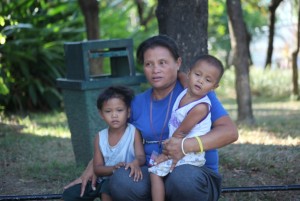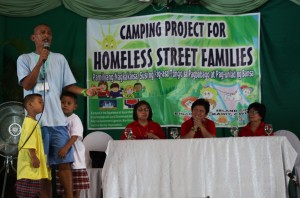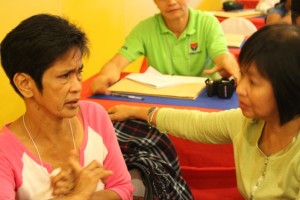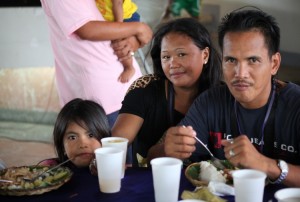Staying in a cemetery, especially after dark would give most people the shivers, but for Malyn Navarro, 41, and a solo parent with four children, the cemetery has been her family’s home for some years now and she just shrugs off the eerie feeling because she simply has no other choice. Since her husband was jailed, Malyn has been living at the North Cemetery with her children, aged 17, 13, 4 and 2.
 Malyn Navarro with her two children
Malyn Navarro with her two children
To earn a living, Malyn scours for scraps and other items which she could sell to buy food.
“Life is hard but thanks to the Modified Conditional Cash Transfer Program for Homeless Street Families (MCCT-HSF), we now have a place of our own, which we rent with the money given to us by the Department of Social Welfare and Development (DSWD). We will be provided with financial assistance for six months to pay for our rent, while we undergo livelihood skills training so we will eventually become economically self-sufficient,” Malyn explained.
The MCCT – HSF covers homeless street families who were not included in the regular Pantawid Pamilyang Pilipino Program because they do not have permanent residence.
Malyn admitted that her eldest son “used to take drugs but since we became beneficiaries of MCCT-HSF, he became responsible. When I was in Palawan attending a conference for community leaders, my eldest son took care of his younger siblings. I am very happy to see how much he has changed after attending Family Development Sessions (FDS) as part of MCCT-HSF,” Malyn enthused.
“As a beneficiary and regular participant of FDS, I also learned the importance of education, responsible parenthood, proper care and nutrition for my children, which I share with others in the community,” Malyn emphasized.
Family bonding
 Mr. Rolando Masayda shares his experiences and learnings during the three-day Family Camp for homeless street families while DSWD Secretary Dinky Soliman (center), Undersecretary Parisya Taradji (right) and DSWD-NCR Director Ma. Alicia S. Bonoan (left) listen intently.
Mr. Rolando Masayda shares his experiences and learnings during the three-day Family Camp for homeless street families while DSWD Secretary Dinky Soliman (center), Undersecretary Parisya Taradji (right) and DSWD-NCR Director Ma. Alicia S. Bonoan (left) listen intently.
“I am thankful to the government, especially to the DSWD for giving street families like us attention and the opportunity to be part of the Pantawid Pamilyang Pilipino Program through the MCCT-HSF project. My children and I are also very grateful that we participated in this 3-day family camp because we experienced how it is to be treated like real visitors,” Mr. Rolando Masayda, father of three children who used to live on the streets of Manila and a beneficiary of MCCT-HSF, shared.
Mr. Masayda also narrated that the family camp brought him closer to his children, “We were able to bond during the three-day activity and I was able to make them feel a father’s love, care and attention.” I rarely spend time with them because I am busy looking for opportunities to earn so that I can buy food for them. With this activity, I really felt good that I was able to show how much I care for my children.”
Mr. Masayda and his family is one of the street families from the National Capital Region who participated in the Family Camp for Homeless Street families in Cavite on November 6-8, November 14-16, and on November 27-29. Around 900 homeless street families participated in the family camp.
According to Director Patricia Luna of the DSWD-Social Technology Bureau, the three-day family camp provided an opportunity for the street families to experience various activities geared towards character building and personality development.
 Director Luna is engaged with an MCCT-HSF beneficiary
Director Luna is engaged with an MCCT-HSF beneficiary
The services offered during the three-day camp included: family development session, skills training, spiritual enhancement, gender sensitivity, empowerment training, forum on children’s rights, story-telling sessions, supervised neighborhood play, film showing, seminar on harmful effects of illegal drugs, zoo tour and swimming.
Education is the key
 “The MCCT-HSF program is heaven sent,” affirmed Mr. and Mrs. Angelo and Jerlyn Dela Cruz.
“The MCCT-HSF program is heaven sent,” affirmed Mr. and Mrs. Angelo and Jerlyn Dela Cruz.
“If there’s anything precious I can pass on to my children, it is education, not wealth because I am poor. With MCCT-HSF, it is now possible to have our own home and for our children to go to school,” declared Angelo Dela Cruz, a 36 year-old pedicab driver who used to live on the streets of Pasay City.
Angelo with his wife Jerlyn and their two children, Angelica, 7, and Norman, 4, have been living on the streets for a long time now. Jerlyn chose a life on the streets to be with her husband, Angelo. “I don’t want to live with my in-laws because they look down on me as a mere pedicab driver, and because she loves me, she went with me. The streets became our home since then,” Angelo narrated.
Despite their poverty, the couple is happy with their two children, “We consider MCCT-HSF as heaven sent and our passport to a better life,” Angelo stated.
CCT for homeless street families
The MCCT – HSF project provides a complete package of assistance to street families such as education and health grants, as well as housing program with access to social services and economic opportunities for the improvement of their living conditions.
Social Welfare and Development Secretary Dinky Soliman explained that the street families under the MCCT – HSF project will receive their monthly cash grants for health and education, provided that they comply with the modified conditionalities.
The conditions that they should comply with are: parents should ensure that their children do not stay or work on the streets; parents/guardians should participate/attend the Family Life Education and Counseling, and Family Development Sessions conducted in their locale; children should be attending any mode of learning, either regular school, Alternative Learning System (ALS), School on Wheels or Supervised Neighborhood Play; parents/guardians should bring their children to health centers for immunizations, weight and height monitoring and preventive check-ups; and household beneficiaries must stay in alternative residences after identification, relocation and/or provision of shelter assistance for them. ###
All quotations of the beneficiaries were in Tagalog which we translated into English.


